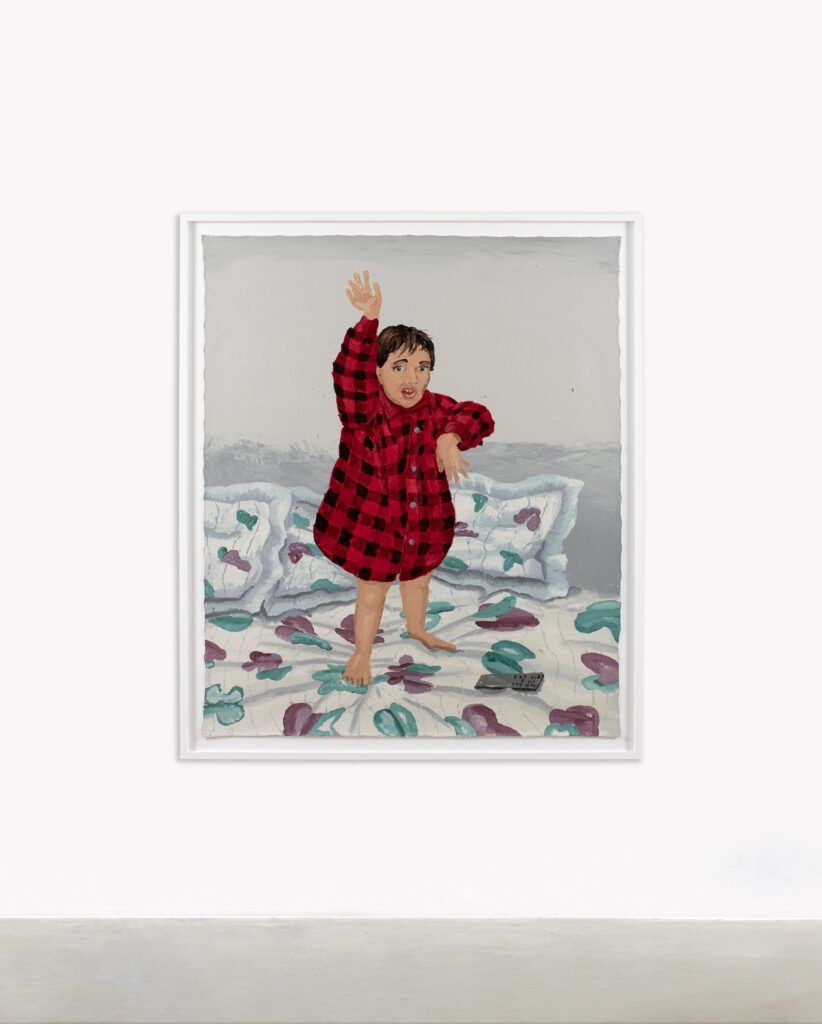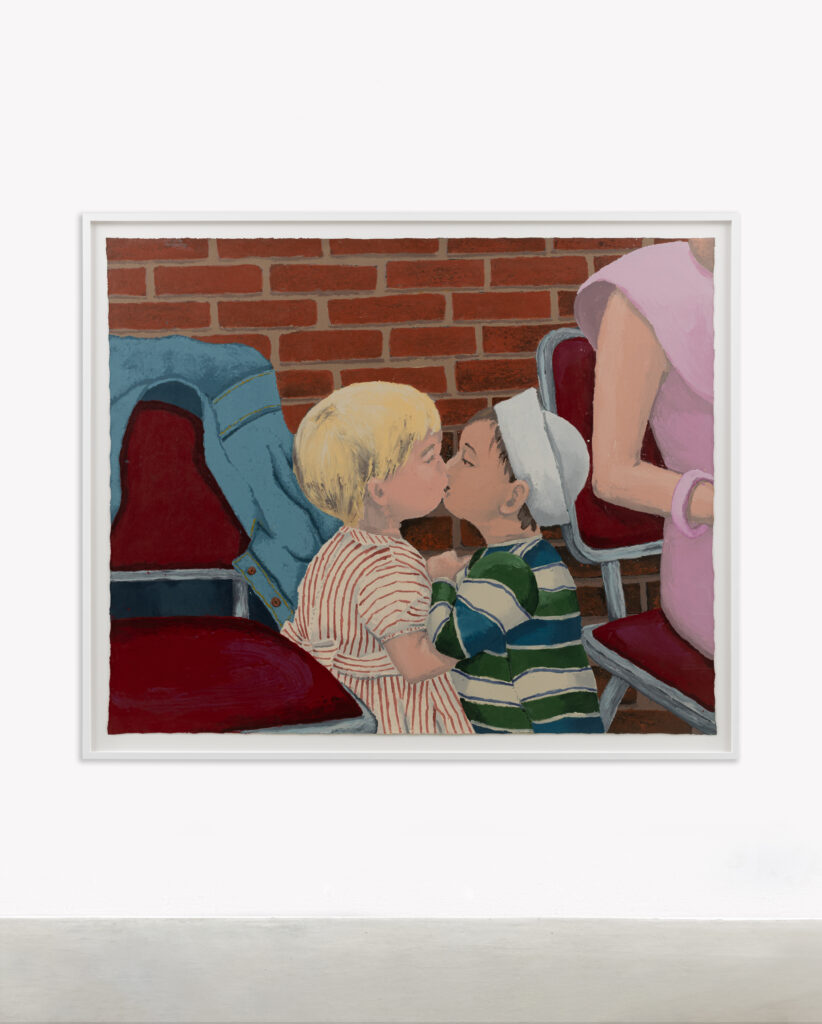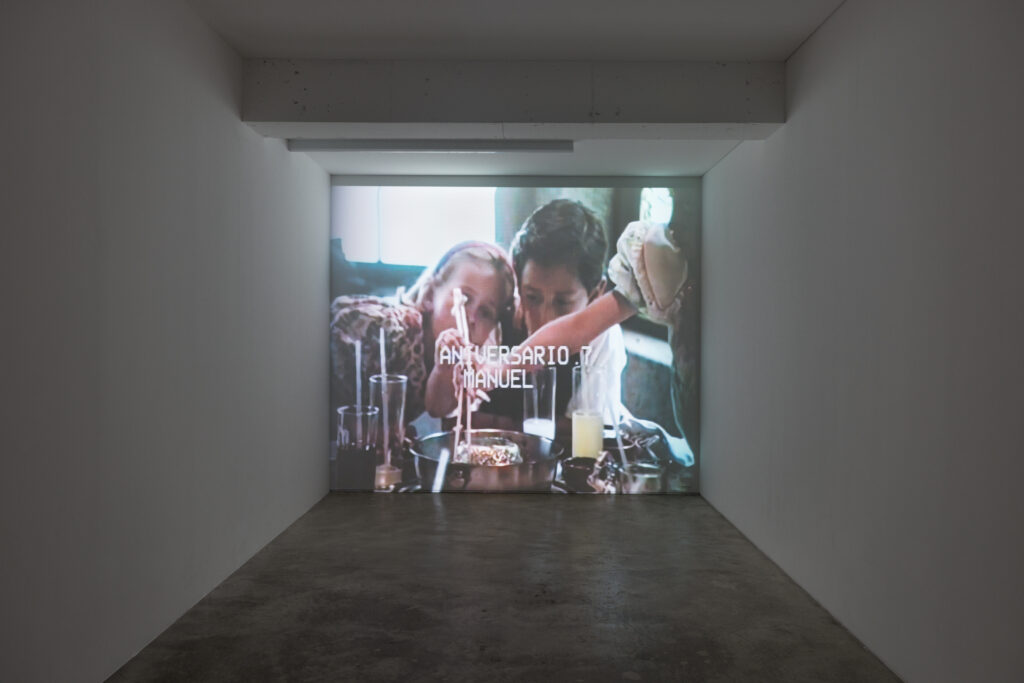파자마
2023. 11. 30 - 2024. 1. 14 | [GALLERIES] PERES PROJECTS SEOUL
마뉴엘 솔라노

Installation View of Pijama at Peres Projects, Seoul. Courtesy of Peres Projects, Photographed by Siwoo Lee, OnArt studio.
페레스프로젝트는 마뉴엘 솔라노(1987년, 멕시코시티)의 첫 서울 전시이자 갤러리와 함께하는 두 번째 전시인 ≪파자마 Pijama≫를 소개한다.
≪파자마≫는 어린 시절과 관련된 솔라노의 전작들을 기반으로 작가의 어린 시절에 대한 탐구를 확장하며 사진과 영상에 포착된 기억에서 파생되거나 기억을 직접 재구성한 생생한 이미지 더미를 발굴하고 조립한다.

Manuel Solano, La Patita, 2020, Video-Color, sound
군중 속 코스튬을 차려입은 아이가 카메라 렌즈를 똑바로 바라보고 손을 흔들어 인사한다. <La Patita>(2020)의 도입부인 이 장면은 수년 후 전시장에서 관객을 맞이한다. 본 전시의 뼈대이자 배경이 되는 <La Patita>와 <As A Child>(2015)는 작가 가족의 기록에서 가져온 영상 작품이다. 1990년대 가족 캠코더의 심미적 특성을 생생히 담아낸 이 작품들은 어린 시절 솔라노의 자신감 있고 활기찬 모습을 보여주며, 주로 공연에서의 가족, 친구, 학교의 맥락을 탐색하고 카메라의 시선은 항상 솔라노에게 쏠려있다. 작가의 작품 전체뿐 아니라 전시작에서 발견되는 대부분의 주제와 모티프는 마치 꽃망울이 피기를 기다리는 꽃봉오리처럼 영상에 나타난다.

Manuel Solano, Pijama, 2023, Painting-Acrylic on canvas, 180 x 150 cm
전시 대부분을 구성하는 신작은 확장된 정지 화면을 연상시킨다. <Pijama>(2023)에서 부모 침대에서 놀던 어린 시절 작가 자화상, 장난감과 사탕이 가득 든 피냐타와 싸우는 장면이 담긴 <Big Bird>(2023)와 같은 이미지는 영상에서 얼핏 본 스쳐 지나간 순간들의 회화적 재해석이다. 당겨 늘이지 않은 캔버스(unstretched canvas)에 그려진 이 작품은 벽에 걸린 흰 시트에 투영된 가족 슬라이드 이미지를 떠올린다. 솔라노는 2014년 HIV 관련 감염으로 인한 합병증으로 시력을 잃은 후 회화에 복귀하며 늘이지 않은 캔버스에 작업을 시작했다. 회화의 촉각적 시각화를 위해 캔버스 위에 못, 핀, 줄을 놓는 방식으로 개발한 방법론의 일환을 처음 시작했지만 이내 작업의 주요한 특징이 되었다. 작품의 시각적·감정적 영향을 강화하고 거칠고 대담한 특성을 부여하면서도, 닳은 가장자리는 각 작품이 더 크게, 계속되는 이야기의 일부분임을 시사한다.

Manuel Solano, Mi Primer Beso, 2023, Painting-Acrylic on canvas, 181 x 221 cm
전시 여정을 통해 눈에 띄는 것은 바로 어린 시절 솔라노와 성장하는 작가 사이의 연속성과 동등성이다. 본 전시는 현재 작가의 핵심 자아인 감성, 활기, 투지, 감각이 스며 있어 당당하고, 과장된 수행성, 자기표현을 향한 솔라노의 성향에 뿌리를 밝혀낸다. <Mi Primer Beso>(2023)는 작가 어머니가 젊은 시절 솔라노 방에 걸어 놓은 사진에서 포착한 중요한 순간을 재구성했다. 해당 이미지는 솔라노와 가장 친한 친구(<El otro Disfraz de Jazmín, 2023>(2023)의 단호하고 자신감 넘치는 주인공)가 첫 키스를 나누고 갑작스런 관계의 끝이 난 후에도 오랫동안 작가를 형성해 온 근본적인 우정을 봉인한다. 과거 경험들이 머릿속에서 캔버스로 이동하며 재구성, 설명, 결속을 거치게 된다. 이렇게 오래 지속되고 영향력 있는 기억은 현재를 반영하는 변화무쌍한 면을 드러낸다.

Manuel Solano, Sunbeam o el disfraz de Tiranosaurio, 2023, Painting-Acrylic on canvas, 181 x 200 cm
솔라노는 어린 시절 단편들을 엄선해 추출한 일련의 작품을 통해 어린 시절 경험뿐 아니라 성인이 되어서도 지속되는 울림을 능숙하게 번역한다. 기억은 연속체가 아닌 비선형 모음으로서, 가족 내에서 공유되는 사진이나 이야기로부터 재구성된 진정한 기억이 공존하고, 다양한 투영, 감정, 감각을 통해 이미지가 형성된다. 기억은 다른 것과 마찬가지로 여러 조각의 일부이자 창조물이다. <Sunbeam o el disfraz de Tiranosaurio>(2023)에서 솔라노는 누락된 이미지를 재구성한다. 사진을 사용하지 않고 매우 생생한 기억에 의존해 그린 이 작품은 어린 솔라노가 티라노사우루스 복장을 한 남동생 사진을 엄마가 지켜보는 모습을 재현하고 있다. 이 미장아빔(mise en abyme) 의 결과로 탄생한 작품은 사라진 또 다른 이미지를 포착하고, <Sunbeam o el disfraz de Tiranosaurio>는 일종의 회고 증거로 사라진 사진의 대체물로 위치한다. 어린 시절의 고고학자인 동시에 아키비스트인 솔라노는 조형적 경험을 발굴, 복원, 보존하며 주체 형성 과정을 전개하는 동시에 열정, 친밀감, 취약성을 번갈아 가며 가슴 아픈 작품을 구성한다.

Installation View of Pijama at Peres Projects, Seoul. Courtesy of Peres Projects, Photographed by Siwoo Lee, OnArt studio.
본 전시 기간 솔라노는 어린 시절 다닌 몬테소리의 다양한 자료를 접목한 퍼포먼스를 선보이며 창의력, 호기심, 자기 구성력을 키운 탐구적 예술 실천에 여전히 반향을 일으키고 있는 방법들을 보여줄 예정이다. 결국 ≪파자마≫는 어린 시절 화가의 초상이라기보단 미래 예술가로의 어린이의 초상이다. 본 전시는 마뉴엘 솔라노의 페레스프로젝트와의 두 번째 개인전이다.
작가의 작품은 세계 유수 기관에서 선보였는데 영국 던디 컨템포러리 아츠(Dundee Contemporary Arts, 2022), 주아오 무라오(João Mourão)와 루이스 실바(Luís Silva)가 기획한 상파울로 피보(Pivô, 2021), 리스본 쿤스트할레 리사본(Kunsthalle Lissabon, 2021), 알렉스 가텐필드(Alex Gartenfeld)가 기획한 마이애미 현대미술연구소 (ICA Miami, 2021), 멕시코시티 카리요 길 미술관(Museo de Arte Carrillo Gil, 2016) 등의 개인전에 참여했다. 또한, 작가가 참여한 단체전으로는 노르웨이 호비코덴의 헤니 온스타 아트센터(Henie Onstad Art Center, 2022), 휴고 비트라니(Hugo Vitrani)가 기획한 파리 팔레 드 도쿄(Palais de Tokyo, 2019), 개리 캐리온 무라야키(Gary Carrion-Murayari), 알렉스 가텐필드, 프란체스카 알타무라(Francesca Altamura)가 기획한 뉴욕 뉴뮤지엄(2018) 등이 있다. 솔라노의 작품은 뉴욕 솔로몬 구겐하임 미술관에 영구 소장되어 있다.
페레스프로젝트
서울시 종로구 율곡로1길 37
02-2233-2335
[GALLERIES] PERES PROJECTS SEOUL
- Dates
- 2023. 11. 30 - 2024. 1. 14











